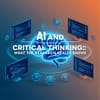The relationship between artificial intelligence (AI) and critical thinking is complex and multifaceted. On one hand, AI can enhance problem-solving by surfacing patterns across large datasets, helping individuals see alternative hypotheses and boundary cases they might otherwise miss. AI can also free up time for deep work and sharpen judgment by automating routine tasks like summarizing notes and extracting data. Additionally, AI-powered search and analytics tools can accelerate evidence gathering, supporting better argumentation and clearer conclusions.
However, there are also potential drawbacks to consider. People often defer to machine outputs, even when they're wrong, which can blunt skepticism and reduce independent analysis. Relying too heavily on AI can erode mental models and reduce skills like estimation, logic, and inference over time. Furthermore, AI models can inherit biases from their training data, normalizing stereotypes or excluding minority cases.
To maximize the benefits of AI in critical thinking, it's essential to design AI systems that support human judgment and critical thinking. This can be achieved through human-AI collaboration, where humans and AI iterate rapidly, with AI proposing and humans critiquing, refining, and redirecting. AI-powered feedback tools can also personalize practice in logic, writing, and problem decomposition.
Ultimately, the impact of AI on critical thinking depends on how it's used. By being aware of the potential benefits and drawbacks, we can harness the power of AI to augment human judgment and critical thinking, rather than replacing it. Education and training programs should focus on developing meta-skills like framing questions, sourcing evidence, and recognizing fallacies to ensure that individuals can effectively collaborate with AI systems.


